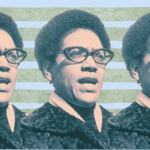Rows of orange people sit handcuffed in a beige room. One of them is my mother.
I squint at the TV that the bailiff has rolled in on a cart. The people aren’t orange, their jumpsuits are. My shoulder presses against my sister’s on the hardwood bench we share, our legs shaking in unison as the heels of our stilettos patter urgently against the courtroom’s marble floor, a mix of nerves and shivers fueled by the pounding, midsummer air- air-conditioning. I tilt my head at the screen, trying to figure out which of these neon uniforms contains our mom, trying to confirm this is real.
Mom is on closed-circuit television and not here in person, which blurs that confirmation. She is not Mom. She is TV Mom. Fuzzy and orange like a peach—or the flesh of a mango.
First-appearance hearings aren’t like they look on Law & Order. There was no perp walk today, no flashing cameras or microphone-pushing reporters as we ducked our faces in shame. It’s just me and Amber sitting in a half-empty courtroom with my friend who’s our attorney and this blurry flat screen that plays our new reality.
It shows a room speckled with inmates in the jail on the other side of the railroad tracks. These potential criminals are kept separate from us, the law-abiding do-gooders who make up this downtown courtroom. They are not like us. We are not like them.
They sit on rows of metal benches lined up like the pews of a church. They wear white socks, sandals, and coveralls the color of traffic cones. Most stare at the floor beneath their feet. TV Mom stares off in the distance, even as her name is called and mispronounced, Ho-SHE-fee-nuh Toe-MEHT-ick, even as the prison guard takes her by the arm and leads her to the microphone so she can speak with the judge in our courtroom.
TV Mom still looks like Mom. Even with the wild hair, the jumpsuit, the shackles binding her wrists and ankles. When the guard nudges her, TV Mom winces like she’s been shocked. She shrugs her arm out of the guard’s grip, saying something that sounds like “Don’t freaking touch me.” Each word becomes clearer, louder, as she approaches the mic. I hold my breath and lean into my sister.
“Dude, she doesn’t even have her hearing aids in,” Amber whispers, her body warm against mine as our legs continue to flutter.
“I know. She can’t make out any of this.”
The judge starts in about Mom’s charge: firing a missile into an occupied dwelling, vehicle, building, or aircraft. Or, as we’ve come to know it in our family: The 2015 Mango Missile Crisis. Our attorney tells us missile is, in this case, a good thing, that even though it makes Mom sound like an assassin, it’s better than firearm, which would mean a mandatory twenty years in prison.
TV Mom stands behind the thin lectern, staring directly into the camera. The fingers of her cuffed hands interlace under the belly of her orange suit.
Mom has spent the night in the Lee County Stockade, a crude Old Florida prison where, just a few years ago, inmates shared open-air cells swarming with mosquitoes. She really does look like a mango, like an overripe one left to rot in someone else’s yard. Her face is gnarled. Her pockmarked cheeks and thick moles stand out in the jail’s harsh fluorescent light. Fits of hair jut from her head like threads of wire.
I realize that to the uninitiated she looks unhinged. Amber and I know: This is just Mom.
When I think of my mother, I don’t see her, I feel her. She’s a stake driven deep into the ground, the kind you see tethering newly planted trees and disaster tarps in place. She has kept our family from toppling sideways while punching a hole clean through our middle.
I have never seen my mother wear a stitch of makeup. Not a swipe of mascara, not a touch of blush. Unlike me, she has nothing to hide. She cuts her own hair with a Flowbee she’s kept in the olive-green bathroom for the better part of two decades. Once a month she hacks off her fingernails while standing over the kitchen sink, picking them from the crevices they fly off to, then squirting them down the drain with the spray nozzle.
The judge talks through bail and discusses Mom’s potential flight risk. Our attorney, one of my oldest friends, points to me and Amber. He tells the judge our brother, Arthur—the third and final of Mom’s As—has work but wanted to be here. He assures the judge that Mom has a loving family, that we will keep her safe, hold her accountable. I wince when he says “loving,” at least in my head. On the outside I smile, no teeth, big eyes, as I’ve taught myself to.
I am wearing a pencil skirt, silk blouse, and ivory cardigan. The diamond earrings Mom gave me when I graduated from the University of Florida thirteen years ago dot my earlobes. My hair has been blow-dried and flat- ironed and finished with sprays that make it as glossy as water. In the hall, before entering the courtroom, I dabbed on another layer of lip gloss, a neutral pinkish beige that wouldn’t detract from the subtly smoky eyes I painted on earlier. After taking my seat, I placed the ivory tote that matches my ivory heels squarely in my lap so as not to take up more room than needed.
I don’t dress up often for work. When I’m not reviewing a restaurant or on assignment for my beat as a food writer, I’m usually in a ratty T-shirt and too-short shorts that I tug at self-consciously when the UPS driver knocks, disrupting my work-from-home routine. But I can play the part when the situation demands. Playing the part is the beat of my life, be it the part of loving daughter, model courtroom attendee, concerned citizen, or, today, all three.
The judge seems to mull this over, this loving family of ours. TV Mom threatens to rat us out, to strip us of our lip gloss and cardigans and lay our collective dysfunction bare. She rambles on about her diabetes, her insulin pump, her blood sugar. Her voice gets louder. My smile fades.
“I am going to freaking die in here! And you people don’t give a goddamn shit!”
“Ms. Toe- MEHT- ick, please,” the judge says, voice booming.
If I were a different person, I’d correct him: “It’s Tometich, Your Honor. JOE-suh-fee-nuh TAW-muh-titch.”
Our attorney-friend apologizes on our collective, loving behalf. TV Mom keeps rambling.
I lean away from Amber as tears nip the corners of my eyes, blurring the scene playing out on this television. I blink them back, hold them in. I make myself watch. TV Mom is Mom. This is real.
When Mom called from jail that morning, I didn’t freak out. If thirty-five years with my mother has taught me anything, it is not to freak out. I called my sister, my brother, that close friend who’s a defense attorney.
I led with: Mom shot a man’s car window out.
I followed with: He was messing with her mangoes.
They got it.
I know Mom loves us. In her own Josefina Tometich way. I’m equally certain she loves her mango trees—deeply, fondly, unabashedly. I’d put her banana trees in a close second for her tropical affections, followed by her atis, calamansi, avocado, and tamarind trees. If her pineapples are fruiting, that throws it all off.
The tidy suburban Southwest Florida yard of my childhood has become a tropical menagerie. For Mom it’s a numbers game. Plant enough things, and surely one or two—or two hundred—will take root. Plant enough things, and maybe this faraway world she’s in will feel a tad more like her Philippines birthplace.
Her yard she can control. Her philandering white husband and all-too-Americanized children she could not, no matter how hard she tried.
As word spread of this Fort Myers grandmother shooting it out over mangoes, possibly the most Florida of Oh, Florida stories that month, my phone rang. The name of my newspaper’s breaking- news reporter glowed across the screen as it vibrated in my hand. I answered on the third buzz.
“I guess you heard,” I said, trying to sound chipper as I sat in my car in the parking lot of the courthouse after Mom’s first appearance, wondering if I had enough funds on any of my credit cards to post bail.
I nodded as he spoke, kicking myself for never changing my byline. I’d been married for seven years. Legally I was Annabelle Martin, but I still wrote as Annabelle Tometich. I should’ve known better by then. Tometiches can never be normal.
I spent my childhood making sure this Tometich faded into the background. I never sat too close to the front or too far in the back of my classes. I was never goth or preppy or hippie. My style was my lack of style: jeans that looked like everyone else’s jeans; tanks and tees that could belong to any Amy/Ashley/Angie. I curated this look as carefully as I did my courtroom look, to show the world that there was nothing to see here! I thought my fake Keds and 5- 7- 9 baby- doll dresses made me perfectly normal, perfectly average, as much as a towering half- Filipina girl can be in a county named for Robert E. Lee.
And yet here I was with that one thing all other writers want: name recognition.
Shit.
I could see the headline: “Mother of Restaurant Critic Jailed for Mango Shoot-out.” I’d click on that. “Mango” is the kicker. Anyone can get into a shoot-out. This is America. But a mango shoot-out? Get ready to go viral. “Restaurant critic” ensures this bit of clickbait will get bites. It’s more tempting than “food writer,” which is what I mostly do. Folks will wonder if they know this critic. Their shoulders will slump slightly when they realize they’ve never, ever heard of me.
That’s the one thing I’ve done right. While I write recipes and chef profiles under my own byline, I write my restaurant reviews under a pseudonym, Jean Le Boeuf. The fake name is meant to sound French and pretentious. It’s meant to hide me. I appreciate that now more than ever.
I shook my head and tried to collect my thoughts, reorganize them, layer this new narrative carefully into the structure of my painstakingly curated life.
“That’s my kooky mama,” I said, trying to keep my tone cheerful, trying to be the same upbeat person I expect myself to be, the girl who can roll with the punches, the one Tometich who never loses her cool. Certainly not over a mango.
“I’m so sorry, Annabelle.”
My colleague sounded calm, businesslike. I tried to match his tone but couldn’t.
“You have to write something, huh?”
The question came out despite my best efforts.
“I mean, of course you have to, but, you know, it’s like a thing then, like a sure thing,” I stammered. “There will definitely be a story.”
Each word was a statement and a question, a certainty rimmed with foolish hope.
There was a half beat of silence, and then I went on, rushing through the rest, because this phone call was just a courtesy. The story would be written. I would not get a say.
“Yeah, of course there will be. I know how it works,” I said. “I just, you know, please be fair. I know you’ll be fair. So, yeah, thank you. Thank you so much for the call.”
“Of course,” my colleague said, sounding like every teacher and adult figure from my childhood: patient and levelheaded as they gauged my ability to handle what stood in front of me.
Business over, his tone softened.
“Is your mom OK? Did she really shoot at that guy—over a mango?’
My head nodded. “Of course she did,” I wanted to say. “You have no idea what that tree means to her.” Instead, I stayed silent. This isn’t the kind of thing that can be explained over the phone. I thought about the right way to answer. I kept it short, cool, honest.
“It’s complicated,” I said. And I meant it.
____________________________


















